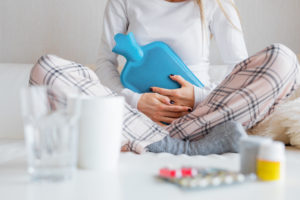Managing Menstrual Cramps
What causes cramps?
Many women experience menstrual cramps, either a few days before they get their period or in the first few days—when the cramps are likely to be more painful. Cramps are caused by contractions in the uterus and cause pain in the lower belly area. These contractions help the period blood flow out. Cramps are usually more prevalent when people first start menstruating, but this does not mean that they completely disappear as women age; they usually become less painful, but they may also become more painful.
Over-the-counter Medication
One of the quickest ways to deal with menstrual cramps is to take an over the counter medication. Though in cases of extreme pain, doctors will prescribe pain medication to their patients, anti-inflammatory over the counter medicine such as ibuprofen, aspirin, and naproxen sodium are most commonly used. While you may be inclined to start taking the medicine once the pains begin, anti-inflammatory medications actually work best if you take them before you start hurting too bad or the day before your period begins. It is recommended to keep taking the medicine for as long as the pain continues, but there are home remedies that you may find ease the pains as well.
Heat
Heat helps muscles relax and this is no different when it comes to menstrual pains. Applying a heating pad, a hot water bottle, or a heat wrap to your abdomen may work as well as medication to relieve cramps. If you do not own these items, you may use a hot towel or take a hot bath/shower to help relax your muscles.
Exercise
In a similar manner, exercising helps the flow of menstrual blood and its quicker, easier discharge. Additionally, exercising helps release endorphins, brain chemicals that promote general well-being. You can enjoy any form of exercise that works for you during your period, but if you find regular exercise difficult you can consider gentler forms of it, such as walking or yoga.
Diet and Hydration
Though they don’t work as quickly as medicine, heat, or exercise, proper diet and hydration can help your body deal with menstrual pains. Bloating is probably one of the most uncomfortable parts of menstrual pains and drinking more water than usual during your period can help you feel better; since you are also losing fluids, try to drink at least 6 to 8 glasses of water per day.
You may be craving salty and/or sweet kinds of food during your period, but these do not actually help with the menstrual pain. Instead, you may want to try consuming more anti-inflammatory foods such as cherries, blueberries, tomatoes, bell pepper, and squash. Cinnamon, ginger, dill, and turmeric consumption also helps with the pains.
Takeaway
Whatever route you choose to take to help you lessen the pains during menstruation, remember that you should always follow the medicinal recommendations and consult your doctor if you are experiencing an abnormal amount of pain, or an extreme amount of blood flow as they may be indicative of a serious health condition.

